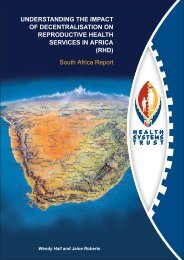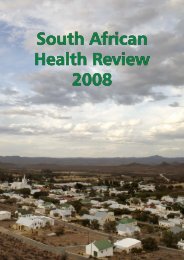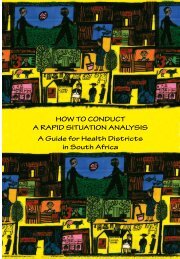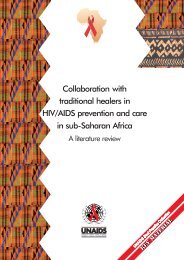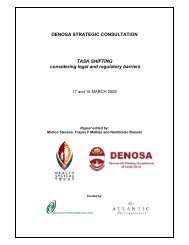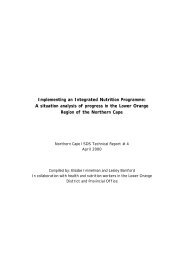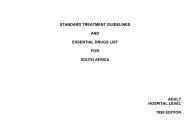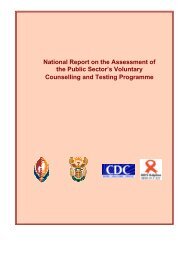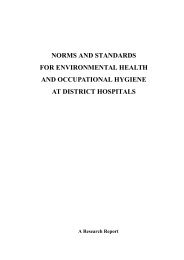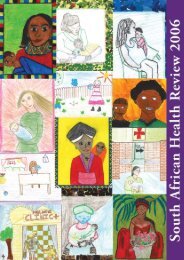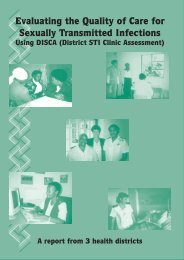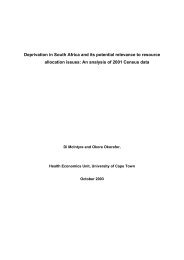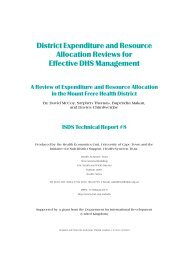SAHR 2007 - Health Systems Trust
SAHR 2007 - Health Systems Trust
SAHR 2007 - Health Systems Trust
You also want an ePaper? Increase the reach of your titles
YUMPU automatically turns print PDFs into web optimized ePapers that Google loves.
Policy and legislative framework<br />
Introduction<br />
Medical schemes are the dominant vehicles for providing<br />
insurance for health care in the private sector in South<br />
Africa. Medical schemes reimburse their members for actual<br />
expenditure on health. They operate on a not-for-profit<br />
basis and are essentially mutual societies, governed under<br />
the Medical Schemes Act (Act 131 of 1998) and managed<br />
by boards of trustees. ,1 They are however, surrounded by<br />
a number of for-profit entities that provide administration,<br />
marketing, managed care, consulting and advisory services.<br />
In the minds of consumers there is often confusion between<br />
the not-for-profit medical schemes and the high-profile listed<br />
companies that act as administrators.<br />
The Medical Schemes Act defines the ‘business of a medical<br />
scheme’ as the business of undertaking liability in return for<br />
a contribution in order to make provision for obtaining any<br />
‘relevant health service’. Medical schemes can grant monetary<br />
assistance to meet expenditure on a health service or<br />
can provide the relevant health service directly or by agreement<br />
with health care providers. Most medical schemes pay<br />
the account from the health care provider chosen by the<br />
member; some have attempted contracts with providers and<br />
very few offer health care services directly. Schemes may<br />
choose to be ‘restricted’ membership schemes if attached<br />
to a large employer, union or other defined group, but all<br />
others are open schemes that must freely admit anyone who<br />
applies.<br />
Revised legislative framework<br />
The history of medical schemes in South Africa began<br />
in 1889 and their status was formalised initially under the<br />
Friendly Societies Act (Act 25 of 1956) and later the Medical<br />
Schemes Act (Act 72 of 1967). 2 Reforms during the 1980s<br />
and early 1990s led to the increasing use of ‘mutuality’ as<br />
opposed to ‘solidarity’ principles. The democratic govern-<br />
<br />
<br />
<br />
50% of the board of trustees must be elected by the members.<br />
A ‘relevant health service’ is any examination, diagnosis, treatment,<br />
prevention or advice; prescription or supply of medicine, appliance or<br />
apparatus; ambulance service, accommodation in hospital, maternity<br />
or nursing home; for a physical or mental defect, illness, deficiency; or<br />
pregnancy.<br />
Voluntary insurance operates on ‘mutuality’ principles where members<br />
are assessed or underwritten on application and pay according to their<br />
risk. Social systems operate on ‘solidarity’ principles where contributions<br />
are not linked to risk. Contributions may be paid equally (as under<br />
community-rating) or according to ability to pay. Solidarity, when fully<br />
implemented, requires that contributions are mandatory for defined<br />
groups.<br />
ment inherited a system in 1994 that had substantially turned<br />
in the direction of mutuality, with members being risk-rated<br />
and charged according to their age and state of health. This<br />
produced adverse results in terms of health care equity and<br />
access with the elderly and those with chronic disease being<br />
most vulnerable.<br />
Since 1994 there has been a substantial return to solidarity<br />
principles although medical schemes still operate in a voluntary<br />
environment. The fully re-written Medical Schemes Act,<br />
No. 131 of 1998, which has been applicable since 1 January<br />
2000 has prepared the environment for Social <strong>Health</strong> Insurance,<br />
as discussed in detail in Chapter 5. Doherty and<br />
McLeod documented the stormy re-introduction of three key<br />
principles under the revised Medical Schemes Act of 1998. 3<br />
➤<br />
➤<br />
➤<br />
Open enrolment: open schemes have to accept<br />
anyone who wants to become a member at standard<br />
rates.<br />
Community-rating: everyone must be charged the<br />
same standard rate, regardless of age or state of<br />
health. However, the current implementation applies<br />
to each benefit option in each medical scheme rather<br />
than the industry as a whole.<br />
Prescribed Minimum Benefits (PMBs): a minimum<br />
package that must be offered by all schemes. Beneficiaries<br />
must be covered in full for these conditions with<br />
no limits or co-payments. Schemes may insist on the use<br />
of a contracted network of providers and formularies of<br />
drugs to manage care.<br />
These three principles enhance the risk-pooling function<br />
within medical schemes. The Medical Schemes Act also<br />
provided for some protections for schemes against antiselection<br />
by members by allowing the imposition of waiting<br />
periods and late-joiner penalties under defined circumstances.<br />
Any funding arrangement, which is intended to assist<br />
in meeting the actual costs of medical services must satisfy<br />
the requirements of the Medical Schemes Act. These requirements<br />
include being registered under the jurisdiction of the<br />
Council for Medical Schemes (CMS), having financial guaran-<br />
<br />
The Prescribed Minimum Benefit package is a list of some 270 diagnosis<br />
and treatment pairs (PMB-DTP) primarily offered in hospital (introduced<br />
1 January 2000); all emergency medical conditions (clarified from 1<br />
January 2003); diagnosis, treatment and medicine according to therapeutic<br />
algorithms for 25 defined chronic conditions on the Chronic<br />
Disease List (PMB-CDL) (introduced 1 January 2004).<br />
48



